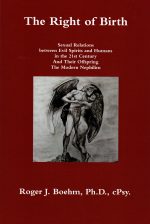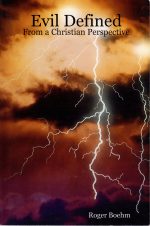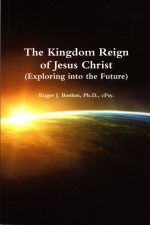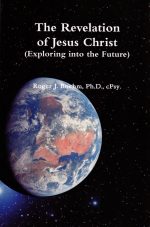Let’s begin by understanding the four biblical Gospels. The word “Gospel” means “Good News,” and is so familiar to Christendom today that many churches teach that its application is uniform. For instance, when we read of the Gospel of the Kingdom; the Gospel of the Grace of God; the Glorious Gospel, and the Everlasting Gospel, it is taken for granted that they all refer to one and the same thing, but that is false. Let’s take a look at the four Gospels.
- The Gospel of The Kingdom.
This is the Good News that God plans to set up a Kingdom on this earth over which David’s Son, Jesus, will reign as prophesied in Luke 1:32-33. “He will be great, and will be called the Son of the Most High; and the Lord God will give Him the throne of His father David; and He will reign over the house of Jacob forever; and His kingdom will have no end.”
Two preachings of this Gospel are mentioned, the first is past, and began with the ministry of John the Baptist, then was preached by Jesus and His Disciples before ending with the rejection of Jesus as King.
The second preaching is still future and will be after the Church is taken out. It will be the fulfillment of Matthew 24:14 (NAS) “And this Gospel of the Kingdom shall be preached in the whole world for a witness to all the nations, and then the end will come.” This Gospel has no reference to the Gospel of grace and salvation that is now being preached to the nations. The Gospel of the Kingdom is for a witness, that is, it is the announcement that the time has come to set up the Kingdom. It will be preached first by Elijah the forerunner (Malachi 4:5-6), and by others who will be commissioned to bear the news to all nations as a proclamation of the coming of Christ as King to occupy the throne of David, and for the purpose of regathering Israel to the Promised Land.
So the Gospel of the Kingdom is not for today but is future and has nothing to do with the Gospel of Grace being preached today.
2. The Gospel of the Grace of God.
This is the good news that Jesus Christ, the rejected King, died on the cross for our salvation. This form of the Gospel is described in many ways. It is called the gospel of God (Romans 1:1), because it has its source in the love of God (John 3:16). Grace is its character (Acts 20:24). Its subject is Jesus (Romans 1:16; 2 Corinthians 10:14), and it is the power of God unto Salvation. And it is the Gospel of peace because it makes peace between the sinner and God, and brings peace to the soul. (Ephesians 6:15).
This is the Gospel, along with the Glorious Gospel, that is to be preached during this church age and is not the same as the Gospel of the Kingdom.
3. The Glorious Gospel.
The Glorious Gospel is that phase of the Gospel of the Grace of God that speaks of Him who is in glory, and has been glorified, and who is bringing many sons to glory. (Hebrews 2:10). It has special reference to the Second Coming and is especially comforting to those who are looking for His glorious appearing (Titus 2:13). It is this Gospel that Satan, the “god of this world,” is particularly anxious to “blind the minds” of those who don’t believe in the Pre-Millennial coming of the Lord. 2 Corinthians 4:3-4(NAS) states: “And even if our Gospel is veiled, it is veiled to those who are perishing, in whose case the god of this world has blinded the minds of the unbelieving, that they might not see the light of the Gospel of the glory of Christ, who is the image of God.”
4. The Eternal or Everlasting Gospel.
This Gospel will be proclaimed by an angel just before the vial judgments. It is the only Gospel committed to an angel. It is neither the Gospel of the Kingdom or of Grace. Its message is not salvation but judgment. Revelation 14:6-7 (NAS) states: “And I saw another angel flying in midheaven, having an eternal gospel to preach to those who live on the earth and to every nation and tribe and tongue and people; and he said with a loud voice, ‘Fear God, and give Him glory, because the hour of His judgment has come; and worship Him who made the heaven and the earth and sea and springs of water’”
It is the good news to Israel and all who are passing through the fires of judgment, because it declares that their troubles will soon end in the judgment and destruction of Antichrist and his followers. It calls on men to worship God as Creator, and not as Savior, and so it is called the Eternal Gospel. Its burden is not repent, or do this, or do that, but , ‘Fear God, and give Him glory, because the hour of His judgment has come; and worship Him who made the heaven and the earth and sea and springs of water’”
From this we see how important it is to distinguish between the various Gospels, not only as to their message, but the period to which they apply, otherwise there will be confusion and false teaching. I fear that is happening today. We need to get outside our traditional Bible box.
Another Gospel.
There is another gospel which is not another, and which Paul repudiated. It is a perversion of the true Gospel and has many seductive forms, and mainly teaches that faith is not sufficient to salvation, nor able to keep and perfect, and so emphasizes good works. (Colossians 2:18-23; Hebrews 6:1, 9:14). The Apostle Paul pronounces a fearful curse upon its preachers and teachers. Galatians 1:8-9 (NAS) states: “But even though we, or an angel from heaven, should preach to you a gospel contrary to that which we have preached to you, let him be accursed. As we have said before, so I say again now, if any man is preaching to you a gospel contrary to that which you received, let him be accursed.”
Words of warning to the church today. Be careful!





